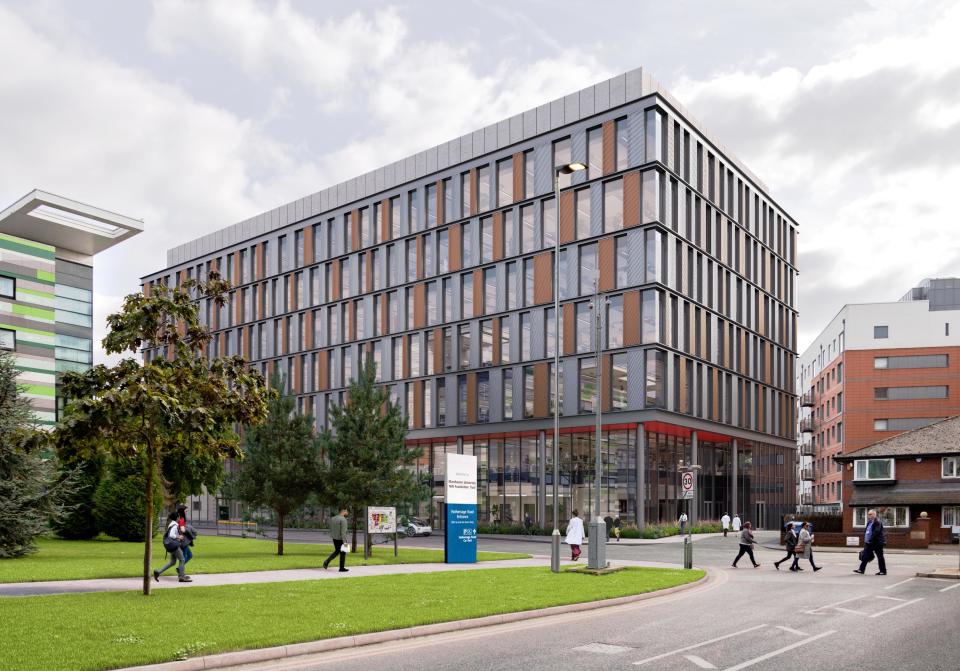Next phase of leading health innovation campus announced
By Bruntwood SciTech

Manchester’s leading health innovation campus, Citylabs, is set to expand again following high levels of demand as it continues to grow its presence as an international hub for genomics and precision medicine. Manchester Science Partnerships (MSP) and Manchester University NHS Foundation Trust (MFT) have unveiled plans to develop Citylabs 4.0, a new £35 million development which will grow the existing Citylabs campus by 125,000 sq ft. The Joint Venture partnership between MSP and MFT, the UK's largest NHS provider Trust, is the first of its kind, with the first phase - Citylabs 1.0 - already home to a thriving cluster of diagnostics, medtech, digital health and genomics businesses who are driving the future of medicine and healthcare. The new development represents another step forward for Manchester’s Oxford Road Corridor innovation district, Europe’s largest clinical academic campus and one of the North of England’s most important commercial areas, generating around £3bn in GVA each year. Subject to planning approval by Manchester City Council, Citylabs 4.0 will be built at the south of the MFT Oxford Road campus, adjacent to Citylabs 2.0 & 3.0, and provide 7 floors of office and lab space where brilliant research will be translated into new healthcare diagnostics and treatments which can then be quickly adopted into Manchester’s health system. Businesses at Citylabs have access to clinical and academic collaborators located on the campus, and an extensive programme of business support including advice on funding sources, new markets, and professional services. They also benefit from the brilliant talent pool generated from the surrounding hospitals and the UK’s largest student population at the University of Manchester and Manchester Metropolitan University. Citylabs further enables cross-sector collaboration between clinical, academic and industry sector expertise, acting as a catalyst for the interchange of ideas and partnership working. This campus extension follows the £60m expansion already underway to create Citylabs 2.0 and 3.0. Citylabs 2.0, currently under construction is due for completion in late 2020 and will be home to global diagnostics company QIAGEN, who will base their European Hub for Diagnostics Development at the campus. Citylabs 3.0, the redevelopment of the Old Saint
Mary’s Hospital and adjoining chapel, has also received planning permission and will begin construction following the completion of Citylabs 2.0. Rowena Burns, Chair, Manchester Science Partnerships, said: “We’ve seen huge developments and significant growth in the life sciences and digital technology sectors over the last five years, with pioneering solutions being created to tackle some of our most pressing health challenges. We’re keen to harness the opportunities created by the growth in these sectors and our plans for Citylabs 4.0 speak to this ambition. “At Citylabs we have created a dynamic ecosystem, a place where companies and researchers work side by side, benefiting from being co-located on Europe's largest clinical academic campus. “We look forward to supporting these innovators in their ambitions to deliver improved health outcomes for our city region and beyond.” Sir Michael Deegan, Group Chief Executive of MFT, said: “The proposed development of our Citylabs campus will further increase the interaction between our hospitals, staff and patients with industry, to help to develop the diagnostics and treatments of the future. It is essential that the NHS and industry work closely together, co-creating solutions to address real gaps in the technology and services we need to constantly improve the treatment outcomes for our patients. “Due to our successful joint venture with MSP, we now have many new collaborative projects and programmes underway that will benefit the services we provide to patients. This supports our vision is to improve the health and quality of life of our diverse population, by building an organisation that excels in quality, safety, patient experience, research, innovation and teaching.” Professor Neil Hanley, MFT’s Director of Research and Innovation, said: “We are all rightly proud that the Citylabs approach has brought together NHS, academic and commercial sectors, completely in line with the UK Government’s Life Sciences Industrial Strategy which made this a national priority. “That we are now driving on with further buildings speaks volumes about our ambition for growth in research and innovation that benefits patient care and the regional economy. I look forward to plans for Citylabs 4.0 being realised.” The development of Citylabs 4.0 will also see sustainability measures being implemented as part of MSP’s commitment to becoming net zero carbon by 2030. The development of Citylabs 4.0 follows the recent announcement of MSP’s next phase of its masterplan of Citylabs’ neighbouring campus, Manchester Science Park, to create an 80,000 sq ft hub for materials science, energy technology and advanced manufacturing businesses in the redevelopment of Base. A public consultation on the proposals for Citylabs 4.0 will be held at Citylabs 1.0 on Tuesday 22nd October from 4-7.30pm.
Stay Connected!
Sign up to our newsletter for the latest news, updates and offers.